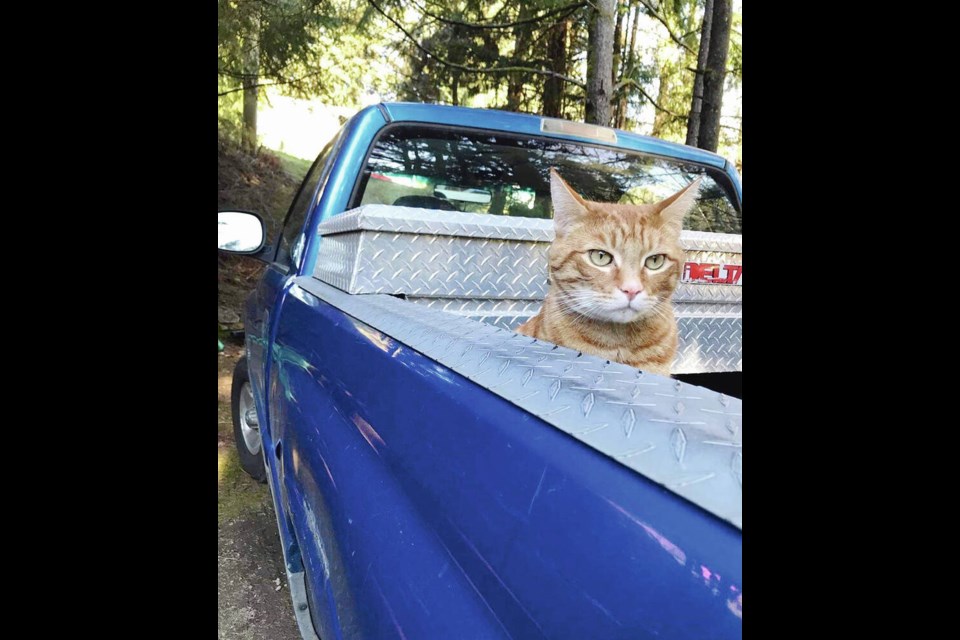A Colwood resident who watched a cougar snatch and kill the family cat in his backyard says signs should be posted in local parks and other areas warning people of the animals’ presence.
Josh Dennis said he heard a ruckus on his deck last Thursday night. He was near the window overlooking the covered hot tub where the family’s beloved cat, O’Malley — a nine-year-old orange tabby — liked to sit. He heard the cat screech, followed by a couple of large thumps before everything went quiet.
“I immediately looked out the window to see the back side of the cougar jumping off the tub,” said Dennis. “I went outside with my brother to look for my cat and found O’Malley in one piece, his neck broken.”
Dennis believes the cougar may have been one of the three spotted by a Colwood homeowner on Monday in a backyard on Latoria Road. The three, believed to be a mother and two growing cubs, were also reported to West Shore RCMP and the B.C. Conservation Service.
An RCMP patrol officer saw one of the big cats run toward Havenwood Park, a 40-hectare forested area with public trails.
The incidents follow an incident in the area in late November where a woman jogger had to seek refuge in a home after being stalked by a cougar in Latoria Creek Park, which borders the Dennis’ back yard on Pondside Terrace.
“There should have been warning signs posted near the entrance of the park detailing an active cougar in the area and information on what to do if an interaction occurs … but there was nothing,” said Dennis.
The B.C. Conservation Officer Service said Monday that officers are monitoring calls and activity reports about the cougars. Acting Sgt. Mark Kissinger said the cougars have not shown any aggressive or threatening behaviour to people so no traps are being set, and conservation officers are hoping they just move along on their own.
Dennis said he doesn’t want to see the cougars destroyed. “Killing the cats is out of the question. Trapping and relocating them is what I would like to see, especially since it’s a mother and her kittens,” he said.
“I’m very heartbroken about O’Malley, but understand that we live in cougar territory,” he said. “Unfortunately, urban sprawl is forcing these beautiful cats into closer and closer contact with people. I just hope that these cats can be persuaded to leave the suburbs and live happily in a forest big enough to sustain them before they prey on any more pets.”
Dennis said he would like to see a better response to emergency wildlife calls that would include the conservation officers service, police and the city working to better inform residents, considering the dangers to small children and pets.
He suggests a dedicated hotline specific to wild animals in urban areas. “A conservation officer begins to investigate the threat level and determine whether the animal needs relocation, police respond to the area to inform residents of the incident immediately, and the city posts important information related to the incident in public areas nearby to educate people about the presence of the animal and appropriate precautions to be taken,” said Dennis.
Dennis said he would also like to see more detailed planning on wildlife corridors by the city and entire region “for dealing with predatory megafauna because housing construction is leading to more and more deforestation, habitat fragmentation and animal-human interaction.”
Colwood mayor Doug Kobayashi, who lives in the Latoria Road area, said he’s hearing residents’ concerns.
Although warning signs for large wild mammals such as cougars and bears are the responsibility of the province, Kobayashi said the City of Colwood’s public works department is now preparing signs for all public parks.
“We are going to be putting signs up that will stay in place 365 days a year, so there is awareness of cougars and bears that are in our areas,” said Kobayashi. “They will be up as soon as possible.”
Colwood has 21 parks within its boundaries and includes open spaces like Royal Roads University.



